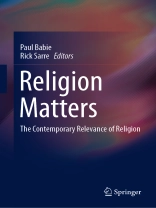This book draws together leaders in science, the health sciences, the humanities, and the social sciences to investigate the role of religion, its meaning and relevance, for their area of specialization. It provides a much-needed fresh perspective on the way in which religion operates within the modern, neo-liberal world.
The book approaches the topic by way of a critical engagement between religion, broadly defined, and the individual disciplines in which each of the contributors is expert. Rather than simply taking the dogmatic position that religion offers something to every possible discipline, each of the chapters in this collection addresses the question: is there something that religion can offer to the discipline in question? That is the value of the book – it takes a truly critical stance on the place of religion in contemporary society.
Table of Content
Introduction.- Part I: Religion and Science.- Chapter 1: Religion and Computer Science.- Chapter 2: Religion and Creation.- Chapter 3: Religion and Engineering.- Chapter 4: Religion and Biology.- Chapter 5: Religion and Mathematics.- Chapter 6: Religion and Physics.- Chapter 7: Religion and Astronomy.- Chapter 8: Religion and Space Exploration/Aerospace Engineering.- Part II: Religion and Health Science.- Chapter 9: Religion and Health Science.- Part III: Religion and the Humanities.- Chapter 10: Religion and Indigenous Peoples.- Chapter 11: Religion and Law.- Chapter 12: Religion and Politics/Liberalism.- Chapter 13: Religion and Architecture.- Chapter 14: Religion and Art.- Chapter 15: Religion and Music.- Chapter 16: Religion and History.- Chapter 17: Religion and Philosophy.- Part IV: Religion and Social Sciences.- Chapter 18: Religion and Education.- Chapter 19: Religion and Criminology.- Chapter 20: Religion and Management.- Chapter 21: Religion and Psychology.
About the author
Paul Babie is Professor of Law and Director of the Law and Religion Research Project of the Research Unit for the Study of Society, Ethics, and Law (RUSSEL) (which he founded in 2007) at The University of Adelaide (Australia). He is a barrister and solicitor (inactive) of the Court of Queen’s Bench of Alberta (Canada), and an associate member of the Law Society of South Australia. His primary research interests include critical theory, private law theory, property theory, and liberation theology and religious legal systems. He has published and spoken extensively in these fields and he teaches property law, property theory, law and religion, water law, and Roman law.
Rick Sarre is Dean and Professor of Law at the University of South Australia (Uni SA). He is the immediate Past President of the Australian and New Zealand Society of Criminology, and is a Fellow of the Society. Professor Sarre has taught in the Business Division at Graceland University (Iowa, USA), at the Department of Law at Umeå University (Sweden), and with Uni SA business programs twinned with Hong Kong Baptist University (Hong Kong). He was the Chair of Academic Board at the University of South Australia from 2011 to 2016.












